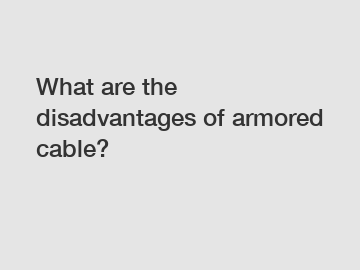Jan. 04, 2024
Electrical Equipment
RUITIAN Product Page
What Are the Disadvantages of Armored Cable?
When it comes to ensuring the safe and reliable transmission of power and data, armored cable is often the go-to choice for many industries. Armored cable is a type of electrical cable that is protected by a metal sheath, providing an extra layer of security. While armored cable offers numerous benefits, it is important to consider its disadvantages as well. In this article, we will explore some of the drawbacks of using armored cable.

Risk of Corrosion.
One of the main disadvantages of armored cable is its susceptibility to corrosion. While the metal sheath provides excellent protection against physical impacts and damage, it can be prone to corrosion over time. Exposure to moisture, chemicals, and other environmental factors can cause the metal sheath to rust or corrode. This can potentially affect the integrity of the cable, leading to compromised performance and reliability. Regular maintenance and inspection are necessary to prevent and address any corrosion issues that may arise.
Difficult to Install and Modify.
Another drawback of armored cable is its installation and modification challenges. The metal armor adds a layer of complexity to the installation process. Compared to non-armored cables, working with armored cables requires additional tools and expertise. The flexibility of the cable is also reduced, making it less maneuverable in tight spaces. Moreover, once an armored cable is installed, it is more difficult to make changes or modifications to the cable routing. This can be a limitation in environments where frequent modifications or reconfigurations are necessary.
Limited Flexibility.
Armored cables are known for their durability and ruggedness, but this comes at the expense of flexibility. The metal armor wrapped around the cable provides excellent protection against impacts, crushing, and abrasion. However, it makes the cable less flexible compared to non-armored alternatives. The reduced flexibility can make it challenging to route the cable in tight corners or spaces where significant bending is required. In applications where cable flexibility is a critical requirement, such as in some industrial settings, using non-armored cables might be more suitable.
Higher Cost.
Another disadvantage of armored cable is its higher cost compared to non-armored cables. The metal sheath and additional protective layers make armored cables more expensive to manufacture. The increased manufacturing costs are often passed on to the consumers, resulting in a higher purchase price for armored cables. Additionally, the installation costs associated with armored cables can also be higher due to the additional tools and expertise required. Therefore, it is important to weigh the benefits of armored cable against the higher upfront costs when considering its use in a project.
Conclusion.
While armored cable provides enhanced protection and security, it is essential to recognize its disadvantages as well. The risk of corrosion, difficulties in installation and modification, limited flexibility, and higher costs are some of the drawbacks associated with armored cables. Careful consideration of these factors is crucial in determining whether armored cable is the most suitable choice for a specific application. If you have any further questions or need assistance in selecting the right cable solution for your needs, please do not hesitate to contact us.
For more steel tape armored cableinformation, please contact us. We will provide professional answers.
Previous: What is whisker limit switch?
Next: 8 Tips for Maximizing the Potential of Ni-MH Battery Packs
If you are interested in sending in a Guest Blogger Submission,welcome to write for us!
All Comments ( 0 )